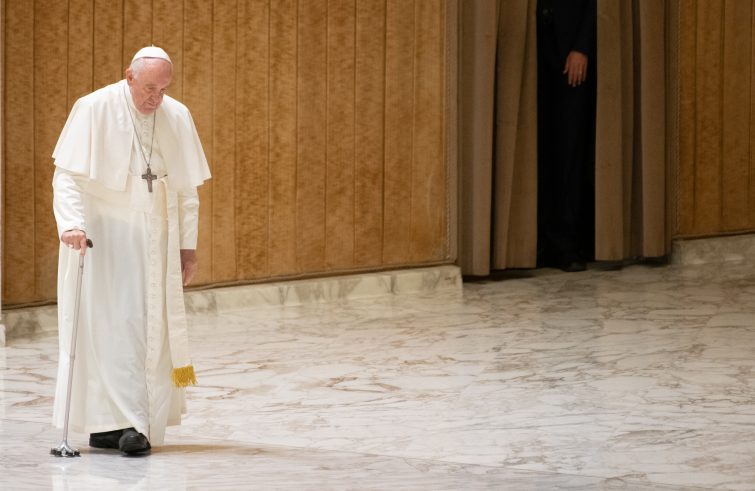
“It was unlike the other journeys”, the Pope said referring to his recent journey to Canada, whose highlights he outlined during the general audience in Paul VI Hall today. “The main motivation was to meet the indigenous peoples to express to them my closeness – the closeness of the Church – and my sorrow, and to ask for forgiveness for the harm done to them by those Christians, including many Catholics, who in the past collaborated in the forced assimilation and enfranchisement policies of the governments of the time”, Francis explained: “In this sense, Canada has embarked on the process of writing a new page in the journey that the Church has been making together with the indigenous peoples for some time. A path of reconciliation and healing, which presupposes historical knowledge, listening to the survivors, awareness and above all conversion, a change of mentality.”
“On the one hand, some men and women of the Church were among the most decisive and courageous supporters of the dignity of the indigenous peoples, coming to their defence and contributing to raising awareness of their languages and cultures” – Francis remarked – “but, on the other hand, there was unfortunately no shortage of Christians, that is, priests, men and women religious and laypeople, who participated in programmes that today we understand are unacceptable and also contrary to the Gospel.” “And this is why I went to ask for forgiveness, on behalf of the Church”,
he continued in unscripted remarks: “It was therefore a penitential pilgrimage. There were many joyful moments, but the overall meaning and tone was reflection, repentance and reconciliation.”
“Together we remembered: the good memory of the thousand-year history of these peoples, in harmony with their land. This is one of the most beautiful things about the indigenous peoples, their harmony with the land. They never mistreat creation, never. In harmony with the land. And we recounted the painful memory of the abuse they suffered, also in the residential schools, as a result of cultural assimilation policies.” Those were the highlights of the first leg of the “penitential pilgrimage” to Canada, to Edmonton, in the west of the country. “After remembrance, the second step of our journey was that of reconciliation”, Francis said outlining he second leg of his visit, in the eastern region of Québec. “Not a compromise between us – it would be an illusion, a mise en scène – but allowing ourselves to be reconciled by Christ, who is our peace”, Francis underlined.
“Remembrance, reconciliation, and therefore healing.” The third step of the journey was on the banks of Lac Sainte-Anne, on the feast day of Saints Joachim and Anne: “From this journey of remembrance, reconciliation and healing springs hope for the Church, in Canada and everywhere”, Francis said, recalling the image of the disciples of Emmaus who, after walking with the risen Jesus, with Him and because of Him, passed from failure to hope.” “The journey that the Church has been making together with the indigenous peoples formed the backbone of this apostolic journey”, Francis remarked, expressing his gratitude to the local Church and Authorities “for their great hospitality and the warm welcome.” “Before the Governors, indigenous leaders and the diplomatic corps – recalled the Pope – I reaffirmed the active will of the Holy See and the local Catholic communities to promote the indigenous cultures, with appropriate spiritual paths and with attention to the customs and languages of the peoples. At the same time, I noted how
the colonizing mentality is present today in various forms of ideological colonization, threatening the traditions, history and religious bonds of peoples, erasing differences, focusing only on the present and often neglecting duties towards the weakest and most fragile.”
“It is therefore a matter of recovering a healthy balance, to recover harmony, which is more than balance, it is something else; to recover harmony between modernity and ancestral cultures, between secularization and spiritual values”, Francis’ recipe: “And this directly addresses the mission of the Church, sent all over the world to bear witness to and “sow” a universal fraternity that respects and promotes the local dimension with its multiple riches.” “I wish to reaffirm my thanks to the civil authorities”, the Pope continued off-text: “the Governor General, the Prime Minister, the local authorities of the places where I went: I thank you very much for the way in which you helped this to be done. And I thank the bishops, I thank them above all for the unity of the episcopate: this was possible, on our part, because the bishops were united, and where there is unity one can proceed.”
The third and last meeting in Canada, in the land of the Inuit, 300 kilometres from the Arctic Circle, with the youth and the elderly, “was marked by hope.” “Especially the last one – Francis said –
I had to feel the blows of the pain of those people,
the elderly who had last their children and did not know what had become of them, due to this policy of assimilation. It was a very painful moment, but one we must face up to: we must face up to our errors, our sins.” “In Canada too, the young and the elderly form a key pairing, a sign of the times”, he said referring to the meeting with the Inuit: “the young and the elderly in dialogue so as to journey together in history amid remembrance and prophecy, which are in tension.” “May the fortitude and pacific action of the indigenous peoples of Canada be an example for all originary peoples not to close themselves up, but to offer their indispensable contribution for a more fraternal humanity, that knows how to love creation and the Creator – Francis concluded, voicing his final hopes – in harmony with creation, in harmony between you all.”











